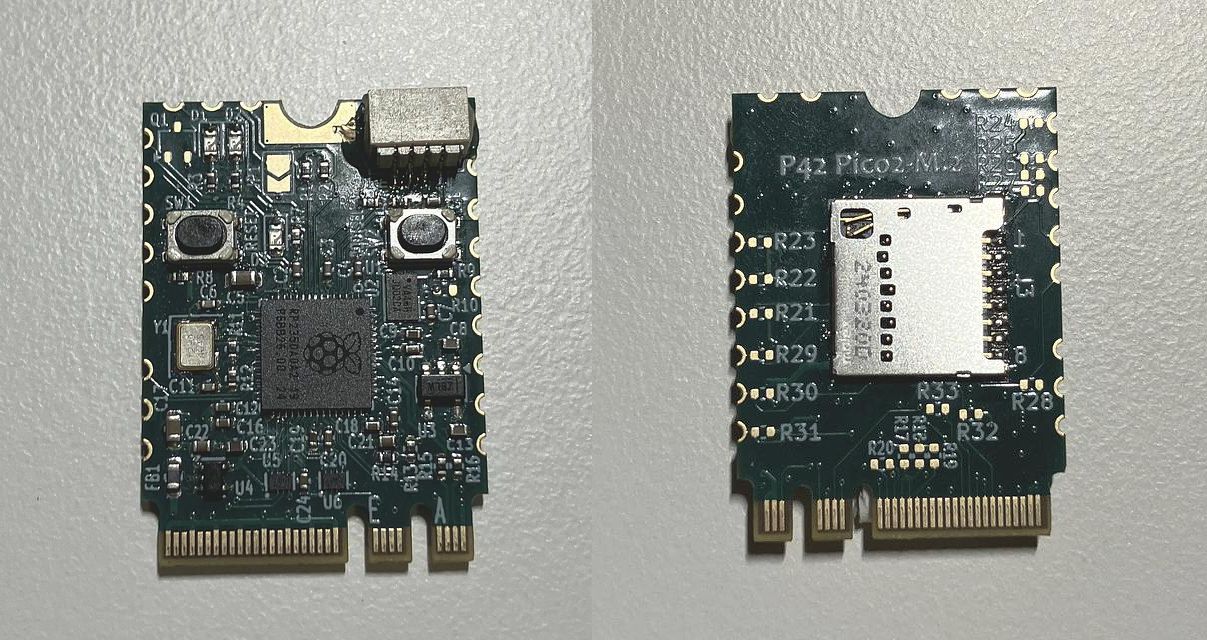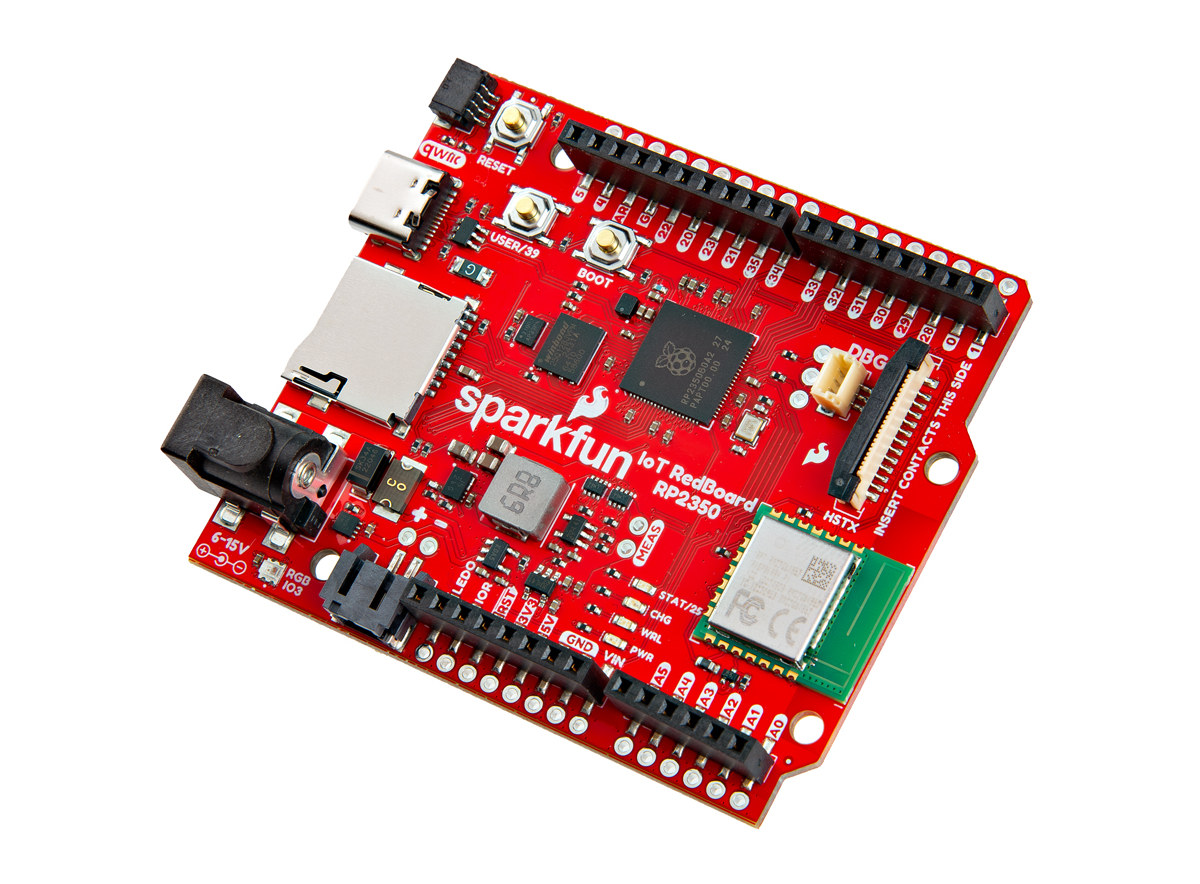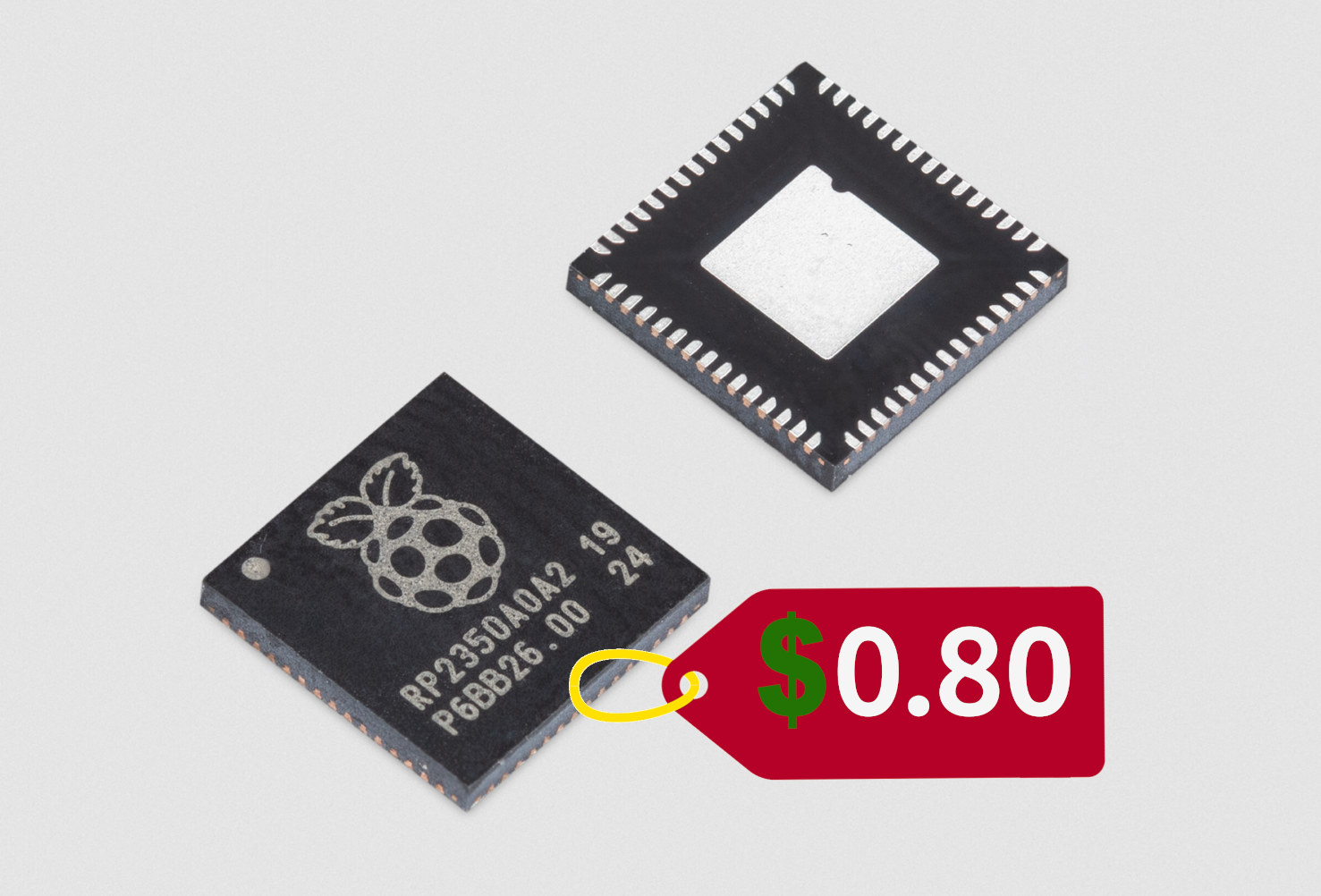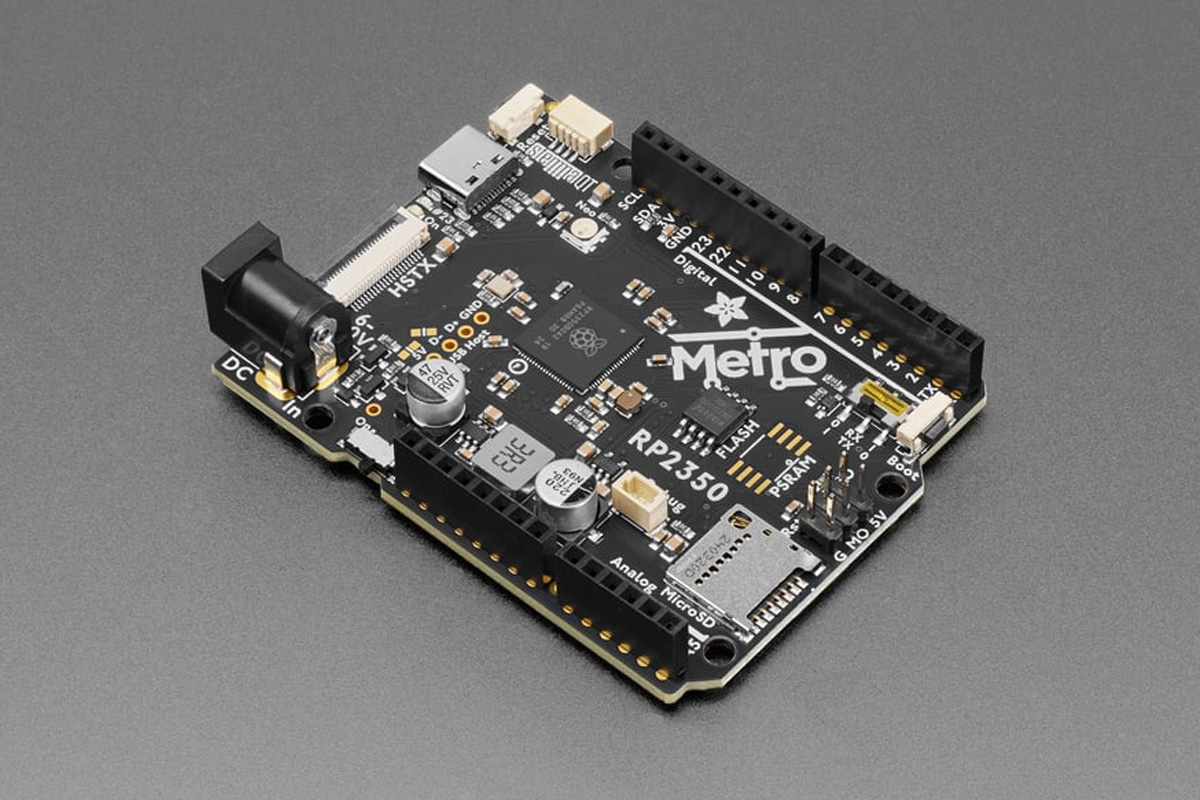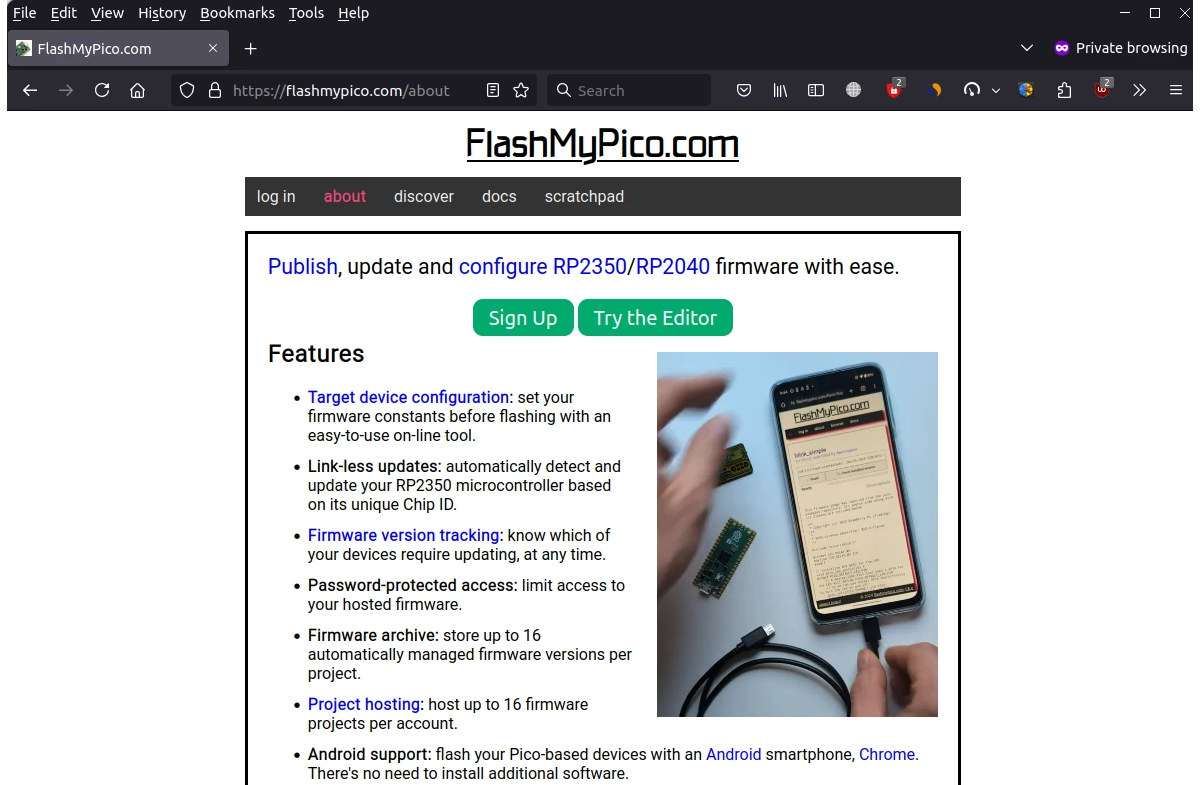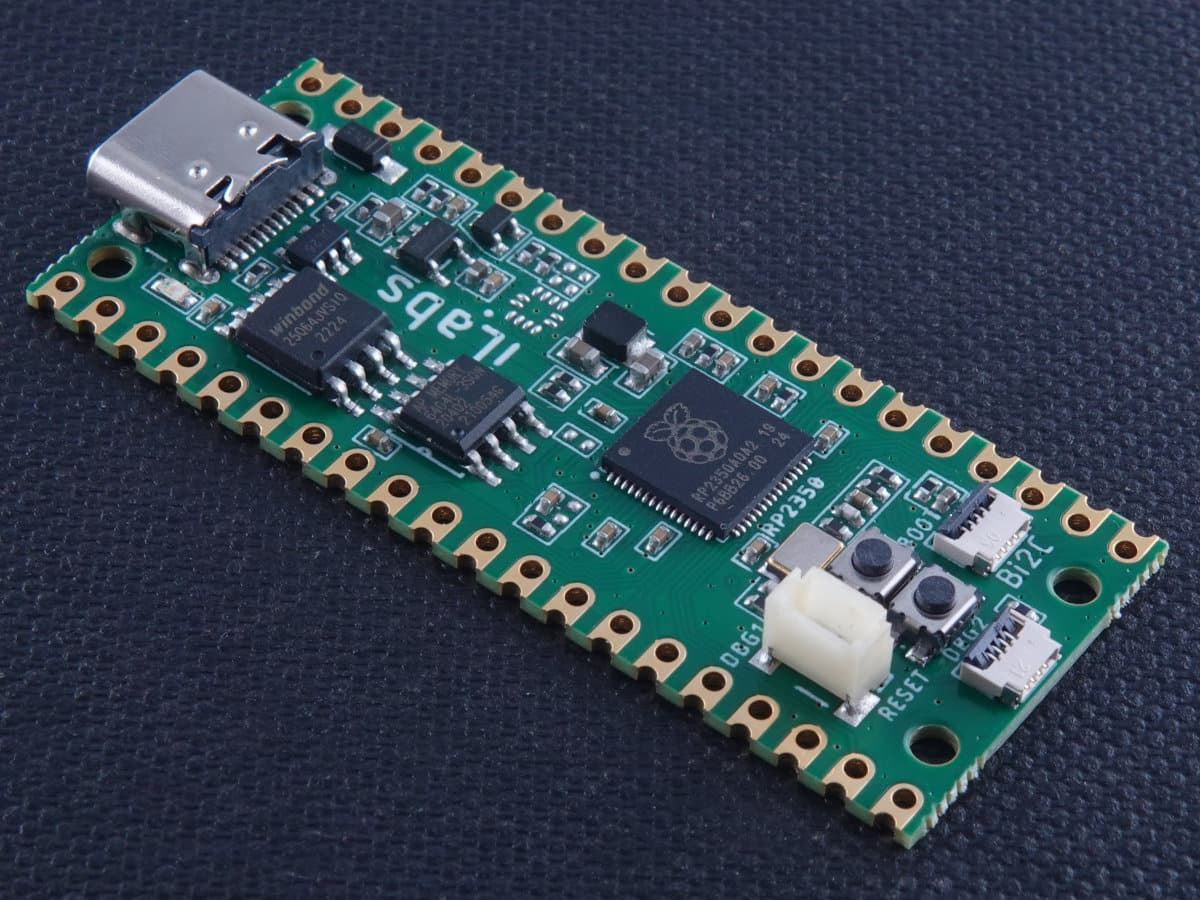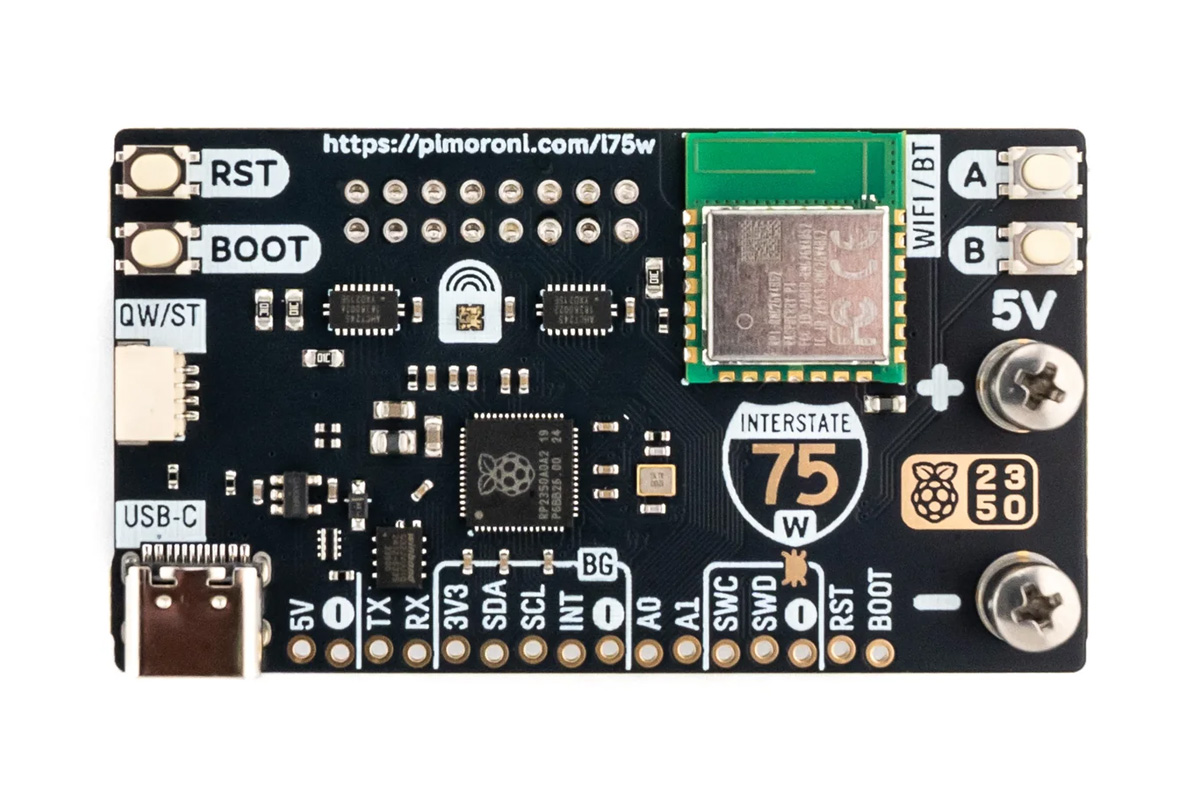LILYGO T-Pico-2350, also called the T-Pico2, is a fully enclosed devkit based on Raspberry Pi RP2350 MCU, an ESP32-C6 SoC for wireless connectivity, a 2.33-inch capacitive color touchscreen display, and an HDMI (DVI) video output port. The design is an update to the T-PicoC3 introduced in 2022 with the case design of the T-Display S3 Pro, and the devkit also features a microSD card slot, a USB-C port for power and programming, two GPIO headers, a 13-pin GPIO FPC connector, two Qwiic I2C/UART connectors, and a PMU for battery management. T-Pico-2350 specifications: Microcontroller – Raspberry Pi RP2350A CPU Dual-core Arm Cortex-M33 @ 150 MHz with Arm Trustzone, Secure boot OR Dual-core RISC-V Hazard3 @ 150 MHz Up to two cores can be used in any combination Memory – 520 KB on-chip SRAM Storage 16MB SPI flash connected to RP2350 MicroSD card slot Display – 2.33-inch color IPS LCD (ST7796S SPI […]
P42 Pico2 M.2 – A Raspberry Pi RP2350 board in M.2 form factor
The P42 Pico2 M.2 may look like an M.2 module, but it’s actually a Raspberry Pi RP2350 development board in M.2 2230 form factor whose edge connector exposes USB, UART, I2C, and control I/Os. The board ships with a 2MB SPI flash and complies with voltage levels defined by the M.2 specification, with some of the interfaces running on 1.8 V. The SWD interface, +3.3 V, GND, and 16 IOs are accessible on castellated pins, and there’s also a QWIIC connector for I2C modules, but it’s not populated by default. The board also comes with a microSD card slot on the bottom and the usual Reset and BOOT buttons. P42 Pico M.2 specifications: SoC – Raspberry Pi RP2350A CPU Dual-core Arm Cortex-M33 @ 150 MHz with Arm Trustzone, Secure boot OR Dual-core RISC-V Hazard3 @ 150 MHz Up to two cores can be used in any combination Memory – 520 […]
SparkFun IoT RedBoard – Raspberry Pi RP2350 or ESP32 WiFi & Bluetooth boards with Arduino UNO R4 form factor
SparkFun has just launched the “IoT RedBoard – RP2350” and “IoT RedBoard – ESP32” boards with Arduino UNO R4 form factor based on respectively Raspberry Pi RP2350B + RM2 wireless module and ESP32-WROOM-32E WiFi and Bluetooth module. Both boards feature Arduino UNO headers and a Qwiic connector for expansion, a microSD card for storage, battery support, USB and DC jack power input, plus a few buttons and LEDs. The RP2350 board also adds an HSTX connector mainly useful for controlling HDMI or SPI displays. Sparkfun IoT RedBoard specifications: MCU sub-system and wireless RP2350 model MCU – Raspberry Pi RP2350B CPU Dual-core Arm Cortex-M33 @ 150 MHz with Arm Trust zone, Secure boot Dual-core RISC-V Hazard3 @ 150 MHz Up to two cores can be used at any given time Memory – 520 KB on-chip SRAM Memory – 8MB PSRAM Storage – 16MB Flash Wireless module – Raspberry Pi RM2 2.4 […]
You can now buy Raspberry Pi RP2350 MCU for 80 cents and up, RP2354A and RP2354B variants coming soon
The Raspberry Pi RP2350 dual-core Cortex-M33/RISC-V MCU was first unveiled along with the Raspberry Pi Pico 2 in August 2024. Since then we have covered many Raspberry Pi RP2350 news and boards, but the microcontroller was hard to source for hobbyist and low-volume projects, which partially explains why companies like NextPCB had promotions offering free PCBA prototyping services for RP2350 designs. The good news is that Raspberry Pi has just announced general availability for the RP2350 microcontrollers starting at $0.80 per unit for the RP2350A in 3,400-piece reels, or $1.1 in single quantity, so anybody can buy the MCUs from their favorite distributor. The British company also announced the RP2354A and RP2354B variants with 2MB of stacked flash memory would soon be available to select partners and mass production will ramp up later this year. Here’s the current official pricing information for the RP2040 and RP2350 microcontrollers. Users can simply […]
Adafruit Metro RP2350 development board follows Arduino UNO form factor, features HSTX DVI output
The Adafruit Metro RP2350 is a Raspberry Pi RP2350 development board that closely follows the Arduino UNO form factor for compatibility with existing Arduino shields. Key features include 37 GPIOs, a microSD card slot, a 5V buck converter (6–17V input), an onboard RGB NeoPixel, a Stemma QT port for I2C peripherals, a 22-pin HSTX port for DVI video output, and a USB Type-C port for power and data. It also provides a Pico Probe debug port, an RX/TX switch for UART flexibility, and a UF2 bootloader for easy firmware updates. Target applications include IoT projects, embedded system development, hardware prototyping, and educational purposes. Adafruit Metro RP2350 specifications SoC – Raspberry Pi RP2350 CPU Dual-core Arm Cortex-M33 @ 150 MHz with Arm Trust zone, Secure boot Dual-core RISC-V Hazard3 @ 150 MHz Up to two cores can be used at any given time Memory – 520 KB on-chip SRAM Security 8KB of […]
FlashMyPico – Raspberry Pi Pico / Pico 2 code editing and firmware flashing from a web browser
FlashMyPico website allows you to write C code, build the firmware, and flash it to your Raspberry Pi Pico, Pico W, Pico 2, or Pico 2 W directly from a web browser instead of having to check out the code from GitHub, build it in a terminal, and then manually copy the resulting binary. I’ve given it a quick with a Raspberry Pi Pico 2 board. The first step is to head over to flashmypico.com from your computer or even an Android smartphone. You’ll need a web browser that supports WebUSB, so for example, Firefox is not an option, and I eventually had to use Google Chrome instead. There’s a detect device link on the bottom left, so I clicked on that first, and my Raspberry Pi Pico 2 was detected as “RP2350 Boot” after I put it in bootloader mode. But it just told me that my board is […]
CPico RP2350 is another Raspberry Pi Pico 2 alternative with USB-C, 8MB flash, 2MB PSRAM, BConnect I2C & debug ports
iLabs CPico RP2350 is a Raspberry Pi Pico 2 alternative with the same form factor, still based on the Raspberry Pi RP2350 microcontroller but equipped with a USB-C port, 8MB flash, 2MB PSRAM, a Reset button, and Bconnect I2C and debug ports. Apart from that, the CPico RP2350 retains the other features of the Raspberry Pi Pico 2 including the two 20-pin PGIO headers, and BOOT button. It joins other Raspberry Pi Pico 2 alternatives like the Waveshare RP2350-Plus adding battery support. CPico RP2350 specifications: SoC – Raspberry Pi RP2350 CPU Dual-core Arm Cortex-M33 @ 150 MHz with Arm Trustzone, Secure boot Dual-core RISC-V Hazard3 @ 150 MHz Up two cores can be used at any given time Memory – 520 KB on-chip SRAM Security 8KB of anti-fuse OTP for key storage Secure boot (Arm only) SHA-256 acceleration Hardware TRNG Fast glitch detectors Package – QFN-60 Memory – 2 MP […]
Pimoroni Interstate 75 W (RP2350) board is designed for HUB75 LED matrix panels
Pimoroni Interstate 75 W (RP2350) is an all-in-one RGB LED matrix driver board designed for HUB75 LED matrix panels commonly used in video walls, advertising displays, and creative signage. Built around a Raspberry Pi RP2350 chip this board also uses the Raspberry Pi’s CYW43439 module for Wi-Fi and Bluetooth and features user buttons, an RGB LED, and a Qw/ST connector for integration with Qwiic/STEMMA QT breakouts. The kit is compatible with various LED matrix sizes (32×32, 64×64, etc.) and comes in a starter kit with panels, cables, and magnetic feet for quick setup. All these features make this kit useful for applications including real-time data like bus times, air quality, or sensor outputs, dynamic signage, scrolling text, and more. Pimoroni Interstate 75 W (RP2350) specifications: SoC – Raspberry Pi RP2350A CPU Dual-core Arm Cortex-M33 @ 150 MHz with Arm Trust zone, Secure boot OR Dual-core RISC-V Hazard3 @ 150 MHz Up […]



